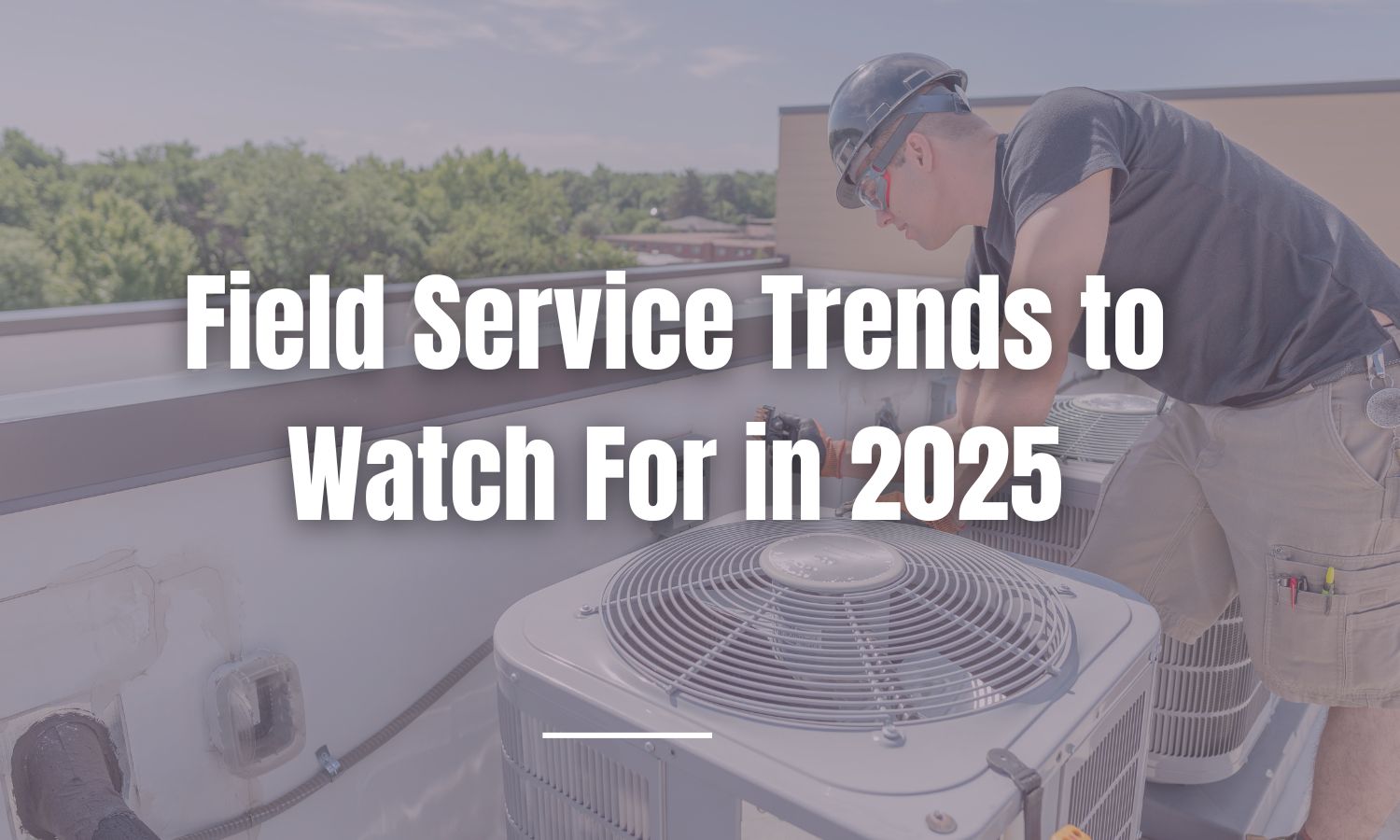Technology is quickly evolving, which is why staying current on the latest field service trends has become increasingly important.
In this blog, we’ll explore the key 2025 field service trends that will shape your contracting business over the coming year.
1. Predictive Maintenance and Advanced IoT Integration
Predictive maintenance and advanced IoT integration is one of the biggest field service trends we’re seeing in 2025. With the integration of more sophisticated sensors and AI-driven analytics, you’ll get unprecedented visibility into equipment performance.
Advanced IoT capabilities include:
- Edge Computing Integration: Real-time data processing at the equipment level for instant decision-making
- Digital Twin Technology: Virtual replicas of physical systems that enable advanced modeling and simulation
- 5G-Enabled Monitoring: Ultra-fast data transmission enabling real-time remote diagnostics
- Self-Healing Systems: Equipment that can automatically adjust parameters to prevent failures
The benefits include:
- Predictive Analytics Accuracy: Higher accuracy in failure prediction
- Zero-Touch Maintenance: Automated systems that can resolve many issues without human intervention
- Carbon Footprint Reduction: Optimized equipment performance leading to significant energy savings
- Advanced Safety Protocols: AI-powered safety systems that can shut down equipment and alert technicians to dangerous conditions
2. Industry 5.0 and Human-Machine Collaboration
The emergence of Industry 5.0 is one of the latest upcoming field service trends that emphasizes sustainable practices and enhanced human-machine collaboration rather than pure automation.
Key aspects include:
- Augmented Human Capabilities: Technology that enhances rather than replaces human expertise
- Sustainable Service Practices: Focus on circular economy principles and environmental responsibility
- Personalized Customer Experiences: Mass customization of service delivery based on individual customer needs
- Ethical AI Implementation: Responsible deployment of AI technologies with human oversight
3. Enhanced Augmented Reality (AR) Applications
AR technology has matured significantly in the past year, with Gartner predicting that nearly 50% of all service management deployments will use AR tools by the end of 2025.
Advanced AR applications now include:
- AI-Powered Visual Recognition: AR systems that can automatically identify equipment and provide contextual information
- Collaborative Mixed Reality: Multiple technicians can work together in shared AR environments
- Predictive Overlay Information: AR displays that show potential failure points and maintenance recommendations
- Customer-Facing AR Tools: Homeowners can use AR apps to show problems to technicians before they arrive
4. Sustainability-First Service Models
Environmental consciousness has moved from a trend to a business imperative in 2025. Field service companies are implementing comprehensive sustainability frameworks.
New sustainable practices include field service trends like:
- Carbon-Neutral Service Routes: Optimized location mapping that minimizes environmental impact by tracking techs and making changes and updates on the fly
- Circular Economy Integration: Services focused on repair, refurbishment and recycling rather than replacement
- Green Technology Partnerships: Collaboration with manufacturers to promote sustainable equipment
- Environmental Impact Reporting: Real-time tracking and reporting of environmental metrics to customers
Updated HVAC Regulations for 2025
Beyond the HFC phase-down that began in 2023, 2025 brings new environmental regulations:
- Refrigerant Innovation: Adoption of next-generation natural refrigerants with near-zero global warming potential
- Smart Building Integration: Requirements for HVAC systems to integrate with building management systems
- Carbon Tracking Mandates: New requirements for tracking and reporting carbon emissions from HVAC operations
5. Customer-Centric Experience Platforms
The focus on customer experience has evolved into comprehensive experience platforms that provide end-to-end service orchestration.
Advanced customer experience features include:
- Implement Field Service Management Software: Invest in FSM software to streamline scheduling, dispatching and resource allocation. This ensures that technicians arrive on time and are adequately prepared, improving customer satisfaction.
- Leverage Mobile Technology: Equip your field technicians with mobile devices that enable them to access information, communicate with customers and document their work more efficiently.
- Omnichannel Communication: Seamless interaction across voice, text, email and video platforms.
- Predictive Customer Service: AI that anticipates customer needs and proactively offers solutions.
- Real-Time Service Transparency: Live tracking of technician location, arrival time and service progress.
- Personalized Service Recommendations: AI-driven suggestions based on customer history and preferences.
- Outcome-Based Service Guarantees: Performance-based service agreements with measurable results.
6. Autonomous Field Service Operations
The concept of autonomous field service operations is becoming popular, where AI systems can manage entire service workflows with minimal human intervention.
Autonomous capabilities include:
- Dynamic Resource Optimization: Real-time reallocation of resources based on changing conditions
- Automated Quality Assurance: AI systems that verify work completion and quality standards
- Predictive Inventory Management: Autonomous ordering and distribution of parts and supplies
7. Advanced Technician Augmentation
Beyond traditional training, it’s important to utilize “augmented technicians” who work seamlessly with AI systems to deliver superior service.
Technician augmentation includes:
- AI-Powered Diagnostic Tools: Handheld devices that use AI to diagnose complex problems instantly
- Continuous Learning Systems: AI that adapts to each technician’s working style and provides personalized guidance
- Performance Optimization: Real-time coaching and feedback to improve technician efficiency
- Safety Enhancement: AI-powered safety systems that monitor working conditions and alert technicians to hazards
8. Data-Driven Ecosystem Intelligence
Data analytics has evolved into comprehensive ecosystem intelligence that provides insights across entire service networks.
Advanced analytics capabilities include:
- Cross-Customer Pattern Recognition: AI that identifies trends across multiple customer bases
- Market Demand Forecasting: Predictive models that anticipate service demand by geography and season
- Competitive Intelligence: Analysis of market conditions and competitive positioning
- Service Innovation Opportunities: AI-driven identification of new service offerings based on data patterns
9. Integrated Service Ecosystems
Another emerging field service trend is integrated service ecosystems where multiple service providers work together through shared platforms and data.
Ecosystem features include:
- Unified Service Platforms: Single interfaces that coordinate multiple service types
- Shared Resource Networks: Collaboration between companies to optimize resource utilization
- Cross-Service Data Sharing: Insights that benefit from multiple service interactions
- Standardized Service Protocols: Industry-wide standards that enable seamless integration
10. Remote-First Service Models
Remote monitoring and troubleshooting have evolved into comprehensive remote-first service models that prioritize virtual resolution before dispatching technicians.
Advanced remote capabilities include:
- Virtual Reality Service Calls: Technicians can provide immersive remote assistance using VR technology
- AI-Powered Remote Diagnostics: Systems that can diagnose and resolve issues without human intervention
- Customer Self-Service Platforms: Advanced tools that enable customers to resolve problems independently
- Hybrid Service Models: Seamless integration of remote and on-site service delivery
Remote-first models are showing significant benefits:
- 24/7 Service Availability: Remote capabilities enable round-the-clock support
- Faster Response Times: Immediate remote assistance reduces wait times
- Lower Service Costs: Remote resolution significantly reduces operational expenses
11. Expanded Service Innovation
Service expansion has moved beyond simple diversification to comprehensive solution ecosystems that address entire customer lifecycles.
Innovative service offerings include:
- Comprehensive Home Intelligence: Integration of all home systems into unified service platforms
- Energy Management Services: Complete energy optimization and sustainability consulting
- Health and Wellness Monitoring: HVAC and plumbing systems that monitor and improve indoor health
- Smart Building Orchestration: Coordination of all building systems for optimal performance
Trending technology integrations for 2025:
- Next-Generation Smart Toilets: Advanced health monitoring and water conservation features
- AI-Powered Climate Control: Systems that learn and adapt to occupant preferences automatically
- Integrated Health Monitoring: HVAC systems that monitor air quality and occupant wellness
- Sustainable Water Systems: Smart plumbing that optimizes water usage and quality
- Voice-Controlled Everything: Complete voice control of all home systems through advanced AI
Stay Up-to-Date on the Top Field Service Trends
Use these top 2025 field service trends to explore how to better serve your customers.
Here is a quick recap of a few key takeaways:
- Agentic AI is the defining technology – Companies that implement autonomous AI systems will gain significant competitive advantages
- Sustainability is no longer optional – Environmental responsibility is becoming a business requirement
- Human-machine collaboration is the new paradigm – Technology enhances rather than replaces human expertise
- Customer expectations have evolved – Personalized, predictive and sustainable service is now the standard
Use these field service trend insights to position your business at the forefront of the service industry revolution and make 2025 your most successful year yet!
Related: Unlocking Success: Field Service Content Marketing Strategies




